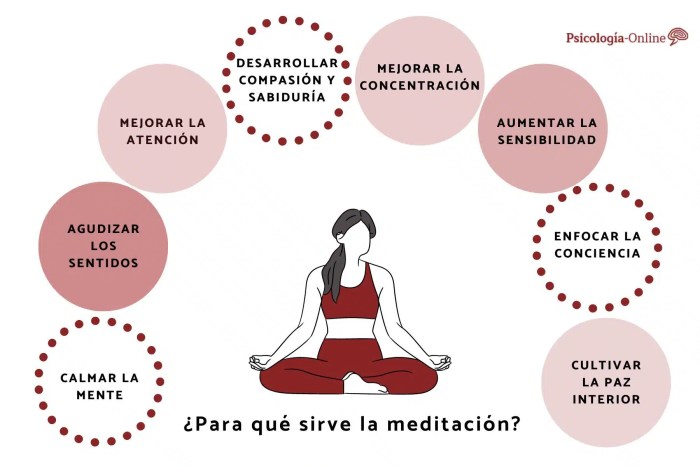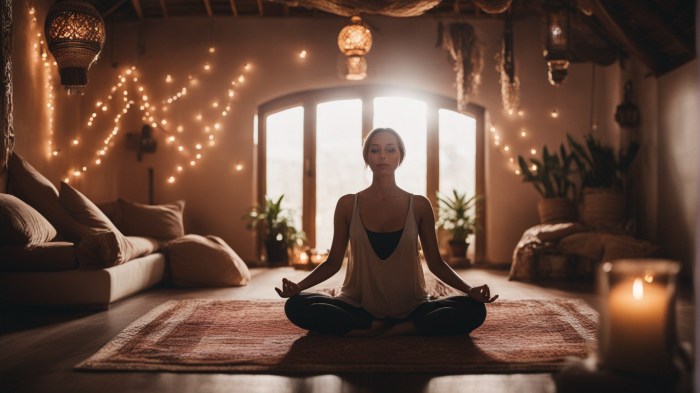5 Ways to Incorporate Meditation into Your Lifestyle dives into the transformative power of meditation, exploring how it can significantly improve mental clarity and focus while reducing stress levels. By incorporating these practices into your daily routine, you can cultivate a sense of inner peace and enhance overall well-being.
Explore the various techniques, benefits, and strategies to seamlessly integrate meditation into your lifestyle for a more balanced and fulfilling existence.
Benefits of Meditation: 5 Ways To Incorporate Meditation Into Your Lifestyle

Meditation offers a wide range of mental and physical benefits that can greatly enhance your daily life. By incorporating meditation into your routine, you can experience reduced stress levels, improved focus, and overall well-being.
Mental Clarity and Focus
- Meditation helps clear the mind of clutter and distractions, allowing for improved focus and concentration.
- Regular practice of meditation can enhance cognitive function and mental clarity, leading to better decision-making and problem-solving skills.
- By calming the mind through meditation, you can experience increased productivity and efficiency in your daily tasks.
Stress Reduction
- Meditation techniques such as mindfulness meditation can help reduce stress by promoting relaxation and lowering cortisol levels in the body.
- Regular meditation practice can improve resilience to stressors and enhance emotional regulation, leading to a more balanced and peaceful state of mind.
- By incorporating meditation into your lifestyle, you can better cope with daily challenges and maintain a sense of calm amidst chaos.
Physical Well-being, 5 Ways to Incorporate Meditation into Your Lifestyle
- Meditation has been shown to have numerous physical benefits, including reduced blood pressure, improved sleep quality, and boosted immune function.
- By relaxing the body and mind, meditation can alleviate symptoms of anxiety, depression, and chronic pain.
- Regular meditation practice can contribute to a healthier lifestyle by promoting overall well-being and longevity.
Types of Meditation Practices

When it comes to incorporating meditation into your lifestyle, there are various types of meditation practices you can explore. Each type offers unique benefits and can be tailored to suit your preferences and needs.
Mindfulness Meditation
Mindfulness meditation involves focusing on the present moment without judgment. It encourages awareness of your thoughts, feelings, and sensations as they arise, allowing you to cultivate a sense of calm and clarity.
- Find a quiet space where you won’t be disturbed.
- Sit or lie down in a comfortable position.
- Focus on your breath or a specific sensation in your body.
- Notice when your mind wanders and gently bring your focus back.
Guided Meditation
Guided meditation involves following the instructions of a teacher or recorded audio to lead you through a meditation practice. It can be helpful for beginners or those looking for structured guidance.
- Search for guided meditation apps or online resources.
- Choose a meditation theme or goal that resonates with you.
- Listen to the instructions and allow yourself to relax and follow along.
Loving-Kindness Meditation
Loving-kindness meditation focuses on cultivating feelings of love, compassion, and kindness towards yourself and others. It can help foster a sense of connection and empathy in your daily life.
- Sit comfortably and bring to mind someone you care about.
- Repeat phrases of well-wishes for yourself and others.
- Extend these feelings of love and kindness to all beings.
Creating a Meditation Space

Creating a designated meditation space in your home can greatly enhance the quality of your practice. By setting up a peaceful and comfortable environment, you can make it easier to focus and immerse yourself in the practice of meditation.
Designing a Meditation Space
Creating a meditation corner or room with minimal distractions is essential for a successful meditation practice. Here are some tips on how to design a peaceful meditation space at home:
- Choose a quiet and clutter-free area: Select a space in your home that is away from noise and distractions. Keep the area clean and free of clutter to create a sense of calm.
- Add comfortable seating: Whether it’s a cushion, mat, or chair, make sure your meditation space has comfortable seating to support your posture during meditation.
- Enhance ambiance with soothing decor: Consider adding elements like plants, candles, or incense to create a calming atmosphere in your meditation space.
- Adjust lighting for relaxation: Soft, natural light or dimmed lighting can help create a soothing environment for meditation. Avoid harsh overhead lights that can be distracting.
- Personalize your space: Add personal touches like meaningful artwork, crystals, or symbols that resonate with you to make your meditation space feel inviting and sacred.
Establishing a Meditation Routine

Consistency is key when it comes to meditation practice. Establishing a regular routine can help you reap the full benefits of this mindful practice.
Steps to Establish a Consistent Meditation Routine
- Set a specific time each day for meditation, whether it’s in the morning before starting your day or in the evening before bed.
- Start with short sessions, gradually increasing the duration as you become more comfortable with the practice.
- Find a quiet and comfortable spot where you can meditate without distractions.
- Use reminders or alarms to help you remember your daily meditation session.
- Track your progress and celebrate small milestones to stay motivated.
Strategies for Overcoming Common Obstacles
- Address the belief that you don’t have enough time by starting with just a few minutes of meditation and gradually increasing the duration.
- Combat lack of motivation by reminding yourself of the benefits of meditation and how it positively impacts your well-being.
- Join a meditation group or class to stay accountable and motivated in your practice.
Significance of Setting Specific Goals and Intentions
Setting clear goals and intentions for your meditation practice can help you stay focused and committed. Whether it’s reducing stress, improving concentration, or enhancing self-awareness, having a purpose behind your practice can drive your motivation and keep you on track.
Incorporating Mindfulness into Daily Activities

Incorporating mindfulness into daily activities can significantly enhance your overall well-being and mental clarity. By staying present and mindful throughout the day, you can reduce stress, improve focus, and enhance your quality of life.
Mindful Eating
- Before eating, take a moment to appreciate the food in front of you.
- Chew slowly and savor each bite, paying attention to the taste, texture, and aroma.
- Avoid distractions like watching TV or scrolling through your phone while eating.
- Express gratitude for the nourishment your meal provides.
Mindful Walking
- Focus on the sensations of walking, such as the feeling of your feet touching the ground.
- Pay attention to your surroundings, noticing the sights, sounds, and smells around you.
- Take deep breaths and maintain a steady pace to stay present in the moment.
- Practice gratitude for the ability to move and explore the world around you.
Mindful Working
- Set intentions for your workday and prioritize tasks mindfully.
- Take short breaks to practice deep breathing or a quick meditation to reset your focus.
- Avoid multitasking and give your full attention to one task at a time.
- Practice mindful communication with colleagues and clients, listening actively and responding thoughtfully.
By incorporating mindfulness into daily activities like eating, walking, and working, you can cultivate a greater sense of awareness, presence, and focus throughout your day. This practice can lead to reduced stress, improved productivity, and a deeper connection to the present moment, ultimately enhancing your overall well-being. Start integrating mindfulness into your daily routine and experience the transformative power it can have on your mental clarity and overall quality of life.
Final Thoughts
In conclusion, embracing meditation as a daily habit can lead to profound changes in your mental and physical health. By incorporating mindfulness into your daily activities and establishing a consistent routine, you can unlock a wealth of benefits that promote a harmonious and centered way of living. Start your meditation journey today and experience the transformative effects firsthand.